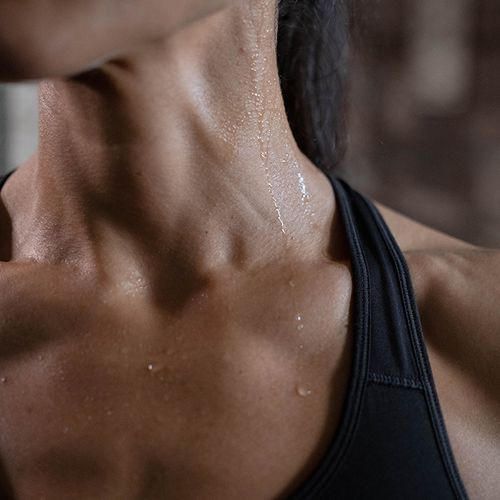Don't complain about how much you sweat when you work out-it could actually be one of the reasons you can work out. A recent study shows that people who sweat more are less likely to have exercise-induced asthma, a type of asthma that typically arises suddenly, five to 10 minutes into a workout, or even after the workout is over. One moment you are playing tennis or basketball or running...the next, you're experiencing symptoms of asthma, such as wheezing, coughing, chest pain and/or a shortage of breath. It can even happen in people with no history of asthma.
Who Gets Exercise-Induced Asthma?
Exercise-induced asthma (or EIA) is brought on by continuous, strenuous aerobic activity, such as running or cross-country skiing. A research study on EIA has provided some insight into who those particularly susceptible individuals might be. At the US Naval Medical Center in San Diego, Warren Lockette, MD, and his team of researchers analyzed the rate of fluid secretion in sweat, saliva and tears) in young members of the military suspected of having EIA. To identify those with the condition, researchers gave 56 healthy volunteers a drug that produced similar physiological effects as EIA and then measured their airflow. Those who experienced a 20% or more drop in airflow were confirmed to have EIA. Next he measured their sweating rates, along with fluid secretions from the mouth and eyes.
The results (published in a recent issue of Chest) showed that people least likely to have EIA produced more sweat and had more saliva and tears than those who are prone to the condition. Those with low airflow also had the lowest rates of fluid secretion in their mouths or eyes and on their skin from sweat. Dr. Lockette said he was surprised by the magnitude of the correlation between sweating rates and EIA.
Sweat Is A Good Thing
How is sweat linked to exercise-induced asthma? Dr. Lockette thinks that external secretions, such as sweat and saliva, reflect how much water is normally secreted within the lung's airways. The drier the airways, the more likely EIA will occur. If this is true, then "giving attention to hydration and nutrition is the next area to study," says Dr. Lockette. He is doing just that. More information about the root causes of EIA may lead to solutions such as better hydration that are easier and safer than current options, including prescription medications taken orally or with inhalers, which carry their own risks.
Delicious Fruit Reduces Coughing by 76%
Researchers from three research centers gave 42 people with asthma (average age 36) 150 mg of purple passion fruit peel extract or a placebo daily. After four weeks, coughing was reduced by 76% in the passion fruit group, compared with 47% for those taking a placebo. Of patients who experienced wheezing, only 19% still wheezed after taking the extract, compared with 79% of those taking a placebo.
Purple passion fruit, native to South America, traditionally has been used there to treat asthma and bronchitis. In this study, the peels were soaked in water, then concentrated to produce high levels of the antioxidant chemicals anthocyanins. Study authors theorize that anthocyanins reduce allergenic and inflammatory reactions in asthmatics. No side effects were reported. These impressive results may have been even better if the study had lasted longer than four weeks. The extract is not yet available in the US, but it should be shortly.
